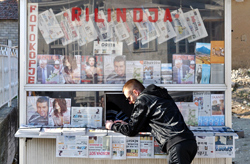
The media in Serbia in minority languages: victimized or privileged?

Photo: Pedja Obradovic
I hope that colleagues from other media outlets in Serbia will forgive me. I may be insufficiently informed, but I know a lot about minority media outlets in South Serbia – both private media and the media that is owned by local self-governments and financed by taxpayers. It is a privilege to work for any of those. I want to make it clear that we are talking about minority media outlets only. Despite a solid progress in other issues, it is still not quite comfortable to be a member of a minority in Serbia.
First things first:
Once upon a time, there was a print media outlet in Albanian language, "Perspektiva". It had been financed by the Ministry of Culture of the Republic of Serbia for four years and during that period the newspaper had suffered financial loss in the amount of 18 million dinars. The newspaper was closed and no one was held accountable. Another newspaper, "Nacionali", also in Albanian language, was financed by the same Ministry in the amount of several million dinars. However, this time the funding was channeled via the Albanian National Council. The newspaper is allegedly being printed in 3,000 copies, out of which 200 is distributed for free, while an unknown number of copies ends up in a company that recycles waste paper. The project involves several Albanian volunteers who are well paid and everyone keeps quiet despite the newspaper lacking an actual readership.
Two local radio-television stations – Bujanovac and Presevo – are public companies. One of them receives money from the budget of the Municipality of Bujanovac amounting to 19 million dinars a year, while at the same time receiving 200-300 thousand dinars each month from the Municipal Council. RTV Presevo receives a similar sum of money despite the fact that their own, locally produced programme amounts to around 15 minutes a day from Monday to Friday. They do not work during weekends despite having a significantly larger number of employees than necessary. Each political party that came to power used to hire 7-8 of their own members – so-called journalists – in the station.
At the same time, private media outlets are not doing so bad either. They also receive money from municipal budgets, various ministries of the Republic of Serbia, the Coordination Body, and other donors. The money is intended for implemented projects, but private media outlets are being disciplined by their financiers – otherwise threats are made and equipment destroyed. The law of the street rules supreme.
What follows is a general picture of the media outlets of national minorities in the south of Serbia.
After they read this article, my fellow Albanians – quite a few of them – will say: The pro-government and pro-Serbian sycophant is at it again.
I will have no other choice than to repeat again: This is us, this is our reality. We feel comfortable in the role of the victim, it is beneficial to us, and everything will be all right if we go on this way; everyone who recognizes reality is a traitor of their own people.
This is why they are fighting so hard against the Media Strategy that was proposed by journalistic associations, which would entail privatization of media outlets in minority languages and withdrawal of the state from media ownership etc. They are only interested in the survival of these media outlets and continuation of their activities – as described here – and do not care about whether there is anyone who actually reads, watches or listens to these media outlets.
Nexhat Behluli
MC Newsletter,
August 26, 2011
View all comments (0) Leave a comment
Published comments contain opinions that are not the opinions of Media Center. Responsibility for the content of messages and their accuracy lies on the website users who posted them.





